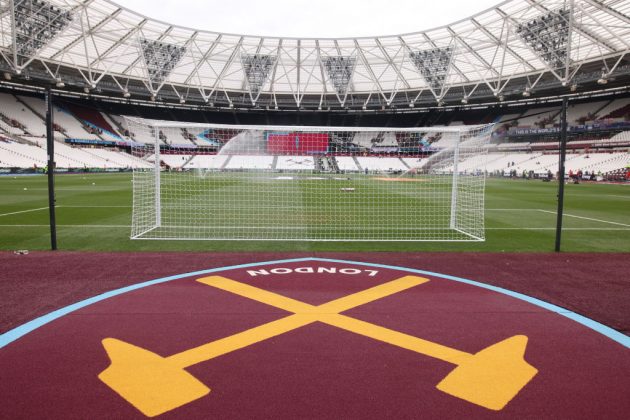West Ham United and the London Stadium have been good for each other – legacy chiefs should do a new deal to give the club more control

This isn’t the article I expected to write; I went back to the London Stadium to bury it not to praise it.
Instead, I came away with a deeper understanding of just what a valuable asset West Ham United Football Club has become.
Nine years on from London 2012 and four from the World Athletics Championships, I’d been warned by an insider that I’d be dismayed to find the former Olympic Stadium now in a shabby state.
And my ticket for the match was at the back of the away end in the curve behind a notoriously distant goal. Just about as sub-prime as you could get.
Maybe 50,000+ supporters milling around masked any dilapidations. Perhaps I was seduced by the palpable air of anticipation in a crowded West Ham Stadium Store a full ninety minutes before kick-off, where one fan was reverentially admiring the rescued John Lyall gates from the old Boleyn Ground that now stand inside the shop. Not much sign of unhappy Hammers here.
Or it might have been the relief that my vantage point was excellent, even if it took until watching TV highlights the next day to realise that my old colleague from UK Athletics, Stuart Attwell, was the speck of a referee on the horizon.
I’d been at the press conference in 2011 that announced West Ham as the anchor tenants for the stadium. I’d lobbied for West Ham’s bid in preference to Tottenham Hotspur’s to ensure a future for the athletics track.
I witnessed, fascinated, what appeared to be a tear of joy roll down the cheek of West Ham co-owner David Gold that day. I then watched a fractious relationship develop between the club and the Legacy Company, the stadium landlord acting on behalf of London’s Mayor.
And I’d lived the crass, low-tech solution deployed by the Legacy Company to move the venue’s seats backwards and forwards each year to accommodate both football and athletics. A false economy that cost millions of pounds and valuable weeks of downtime each season.
Throw unhappy football fans into the mix and it is little wonder that the London Stadium is an Olympic legacy that few now want to applaud.
Renegotiating lease makes sense for West Ham and Mayor
It is surely no coincidence, though, that a consortium is reportedly interested in buying West Ham, its pursuit of the club currently playing out as something of a phoney war in the media.
Last month Tony Cottee was declared as the latest former Hammer to support the putative bidders. This weekend’s matchday programme advertised official tours of the stadium led by Cottee. Could be interesting.
A lease on a 60,000-seat venue that lasts until current supporters’ great great grandchildren will be donning claret and blue shirts, at a minuscule rent, and with upkeep largely at the expense of the landlord, is an incredibly valuable asset. And all without the £1bn cost that Tottenham incurred building their own new home.
Forbes recently estimated that West Ham United has a value of $508m (£369m). On the basis of the club’s stadium arrangement alone, this looks far too low to me.

The wannabe buyer, PAI Capital, says it has discussed new lease arrangements with the Legacy Company. Smart move. There can be little doubt that the Mayor would like to reduce the burden of management and upkeep of the London Stadium.
There’s clearly a deal to be done with the Legacy Company, whether by West Ham’s current owners or any new ones in future.
Extend the lease, take over management for 52 weeks of the year – enjoying the profits from summer gigs and other sports – and come up with a new rental figure that carries with it greater responsibility for repair and maintenance.
The Mayor could then breathe a sigh of relief at shucking off a loss-maker while West Ham further control of their own destiny.
UK Athletics must make up its mind over London Stadium
What of athletics? The pandemic and the costs of seating moves put paid to any events at the London Stadium this summer.
Next season’s calendar, crowded by global championships because of Covid rescheduling, might not even have a gap for a London Diamond League meeting. And as each barren year goes by, the argument for elite athletics in the stadium grows weaker.
As I handed over the chair of UK Athletics in 2017, I advised its new leaders to decide urgently whether they wanted to continue to use the London Stadium and, if they did, to go all in against the constant pressure to give it up.
If not, they should do an early deal with the Mayor to relinquish UKA’s 50-year rent-free sub-lease and accept either a very chunky sum of cash to support the sport, or a fully redeveloped athletics venue at Crystal Palace.
So far, frustratingly, they appear still to be undecided which way to go and their negotiating hand just gets weaker.
If it was still up to me, I’d be arguing for retro-fitting an automated seat moving system. This would pay back in only a few years, wouldn’t cramp West Ham, and would maximise the opportunities for summer revenues for whoever controls the London Stadium outside the football season.
There is no reason why this shouldn’t be in the mix in any three-way negotiations between the Legacy Company, West Ham and UKA. And athletics would still have its iconic Olympic home.
Ed Warner is the former chair of UK Athletics and current vice-chair of World Para Athletics. An investment banker, he is also a former chair of Grant Thornton and current chair of of derivatives exchange LMAX, Air Partner PLC, and two listed investment companies. Sign up to Ed’s newsletter at sportinc.substack.com
